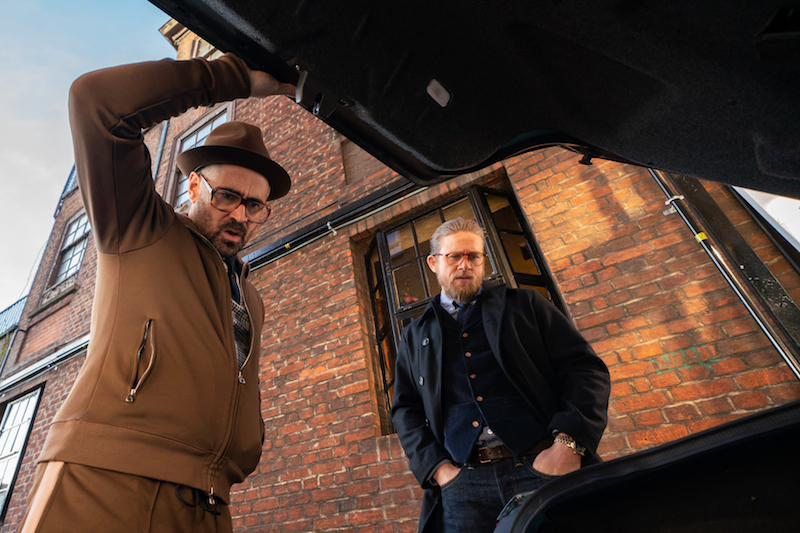
Back in the late ’90s/early aughts, Guy Ritchie made a couple of swaggering, hyperviolent dark comedies about British toughs, Lock, Stock and Two Smoking Barrels and Snatch. Then, for a while, he became something of a gun for hire—directing slick studio offerings like Sherlock Holmes, The Man from U.N.C.L.E., and Aladdin. Now he’s back with another one of his trademark violent comedies, albeit this time, in a better suit.
There’s no doubt that Ritchie has talent—he may be too show-offy for my taste, but he tells his stories with an enormous amount of invention and verve. I’m just not interested in what he’s selling. His films are paeans to masculinity. They mythologize the cool guy criminal—one who keeps a level head about him, has a code of honor, and will kill you where you stand (but only if you truly deserve it). Yes, the films are comedies and this glorification is meant to be ironic. But not that ironic.
In The Gentlemen, the coolest of the cool is Matthew McConaughey, playing Mickey, a high-class marijuana dealer. Mickey has found a brilliant way to grow his weed—he uses the property of landed gentry, many of whom are hard up for cash. He has underground, state-of-the-art laboratories where his product is perfected.
Notably, Mickey doesn’t sell the hard stuff (he’s too noble for that). He’s also highly devoted to his gorgeous wife (Michelle Dockery). She’s a powerful character, to some degree (she owns a high end car repair shop staffed with female mechanics)—but she’s a fantasy, a tough in the boardroom, hot in the bedroom type. What’s more, she only exists on the margins of the film. Far worse, at one point, she is nearly raped, until Mickey bursts in to save her. (Sorry, if that’s a spoiler, but it must be discussed.)
Note to male filmmakers. Here are two of the ways rape should never be deployed in a film:
•To give our male hero a savior moment.
•To enrage said male hero so much that he commits violent acts to avenge her.
In short, rape is not a plot point. Learn it, live it, know it.
In fairness, McConaughey is great as Mickey—the role seems like an extension of those Lincoln ads where he waxes bro-mantically while swathed in luxury—and his is just one of the many impressive performances in the film.
Of particular note is Hugh Grant (officially having the time of his life as a character actor these days), playing Fletcher, a fast-talking, gay, cockney-accented hustler who puts the “unreliable” in unreliable narrator. Charlie Hunnam plays Ray, Mickey’s deputy, a man of seeming restraint and class who will nonetheless go absolutely HAM on you if you cross him. Also having fun: Colin Farrell as the owner of a boxing gym, yet another of Ritchie’s fabled nice guys who, when pressed, can be a cold-blooded killer; and Henry Golding, playing against type as an ambitious and ruthless young gangster.
On other hand, I’m not sure what the hell Jeremy Strong, dressed in bowler hats and tortoise-shell glasses so he resembles no less than Toby Turtle, is doing here. He plays his character—a billionaire looking to buy Mickey’s company—with a fussy, mincing affect. Is he supposed to be gay? If so, it’s an offensive caricature. His Matthew is always seen with a glamazon woman but I think it’s meant to be a joke—that she doesn’t she realize (or care) that her rich beau is a homosexual.
This character leads to another one of my issues with the film: namely, its casual racism/homophobia. The film seems to long for the days when you could make a racist joke without repercussions; it defiantly thumbs its nose at so-called political correctness. To that end, a joke is made at Henry Golding’s expense (Fletcher says he has a “Ricense to Kill”), another joke is made about a Chinese gangster’s last name sounding like a particular obscenity, and, racially-charged insults are hurled at black people routinely. (“I’m not racist!” Ritchie would no doubt protest. “My characters are!” Whatever.) There’s also a disgusting bit involving a villain being violated by a giant hog (mercilessly off camera). The less said about that bit the better.
Okay, I lied. Let’s talk about that bit. It’s just so damn . . . immature. I mean, emasculation-via-farm-animal? That’s schoolyard stuff. That’s my problem with this film. It’s well dressed. It’s well made. I’ll even grant that it’s entertaining. But it seems Guy Ritchie hasn’t matured one bit in 20 years. Hell, if anything, he’s regressed.
